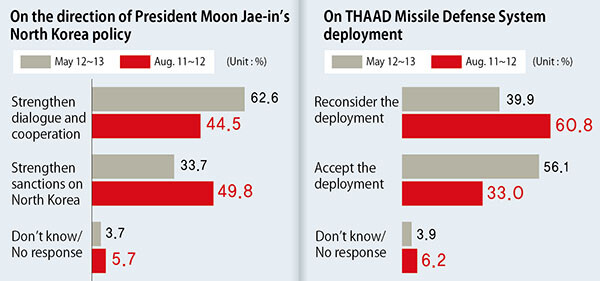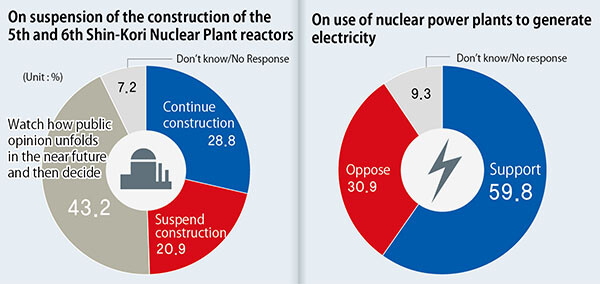hankyoreh
Links to other country sites 다른 나라 사이트 링크
South Korean views on national security shift as crisis deepens with North Korea

The toughest area for President Moon Jae-in as he marks 100 days office is national security, survey results show. More and more South Koreans were found to support stronger sanctions against North Korea and deployment of the THAAD antimissile system, citing the uncertain security situation. National security was also the area most often named as the “most poorly handled” by the administration since it took office, with fewer opportunities to take advantage of the combined dialogue-and-pressure approach advocated by Moon.
The ratings were seen as reflecting greater anxieties over national security in the wake of North Korea’s test launches of ICBMs - two of them in July alone - and the recent war of words between Washington and Pyongyang, with their dueling threats of an intensive military response.
A survey of 1,000 adult men and women nationwide on Aug. 11-12 conducted by the polling firm Korea Research at the behest of the Hankyoreh and the Hankyoreh Economy & Society Research Institute, showed 49.8% of respondents saying South Korea should “move toward stronger sanctions against North Korea,” compared to 44.5% saying it should “increase dialogue and cooperation.” Both responses were within the margin of error for the survey. In comparison with a previous Hankyoreh survey on May 12-13, which showed 62.6% of respondents favoring dialogue and cooperation and 33.7% favoring sanctions, the new results suggest a rapid change in mood. The latest results show a 16 percentage point rise in support for stiffer sanctions, as many of those who previously saw dialogue and cooperation with Pyongyang as necessary gravitate toward stronger sanctions instead. Support for heavier sanctions prevailed for all age groups except respondents in their forties, and for all party affiliations apart from Minjoo Party and Justice Party supporters.
The change in opinion over a three-month span appears largely attributable to the increasingly unstable political situation on the Korean Peninsula. The survey results showed 73.5% of respondents saying they felt “uneasy” about South Korea’s current security situation. Anxiety appeared particularly strong among conservative-leaning respondents, 84.8% of whom reported feeling uneasy and 40% of whom said they were “extremely uneasy.”

The change has also made a huge difference in support for the THAAD deployment, which has been the subject of controversy since the Park Geun-hye administration (2013-16). The latest survey showed 60.8% of respondents saying the THAAD deployment decision “should be accepted,” which is up 20.9 percentage points from the 39.9% who gave the same response in the May Hankyoreh survey. The proportion of respondents saying the decision “should be reconsidered” fell by 23.1 percentage points to 33.0% from 56.1% in the May survey. With 67% of respondents supporting the THAAD decision citing “security” as a reason in the May survey, the latest results appear to reflect a shift toward a “go ahead and deploy” attitude amid deepening security worries, regardless of whether the weapons system is actually effective at shooting down ICBMs.
Notably, even supporters of Moon and the Minjoo Party favored accepting the THAAD deployment decision. Roughly half (50.7%) of respondents who reported voting for Moon in the presidential election, and half (50%) of Minjoo Party supporters, said the THAAD deployment decision “should be accepted.” Support for reconsidering the deployment stood at 43.6% and 42.2% for the two groups, respectively. By age group, respondents aged 19-29 showed roughly even levels of support for accepting and reconsidering the deployment decision at 45.6% and 46.3%, respectively. Support for accepting the deployment increased among older respondents.
By Kim Bo-hyup, staff reporter
Please direct questions or comments to [english@hani.co.kr]

Editorial・opinion
![[Editorial] Does Yoon think the Korean public is wrong? [Editorial] Does Yoon think the Korean public is wrong?](https://flexible.img.hani.co.kr/flexible/normal/500/300/imgdb/original/2024/0417/8517133419684774.jpg) [Editorial] Does Yoon think the Korean public is wrong?
[Editorial] Does Yoon think the Korean public is wrong?![[Editorial] As it bolsters its alliance with US, Japan must be accountable for past [Editorial] As it bolsters its alliance with US, Japan must be accountable for past](https://flexible.img.hani.co.kr/flexible/normal/500/300/imgdb/original/2024/0417/6817133413968321.jpg) [Editorial] As it bolsters its alliance with US, Japan must be accountable for past
[Editorial] As it bolsters its alliance with US, Japan must be accountable for past- [Guest essay] Amending the Constitution is Yoon’s key to leaving office in public’s good graces
- [Editorial] 10 years on, lessons of Sewol tragedy must never be forgotten
- [Column] A death blow to Korea’s prosecutor politics
- [Correspondent’s column] The US and the end of Japanese pacifism
- [Guest essay] How Korea turned its trainee doctors into monsters
- [Guest essay] As someone who helped forge Seoul-Moscow ties, their status today troubles me
- [Editorial] Koreans sent a loud and clear message to Yoon
- [Column] In Korea’s midterm elections, it’s time for accountability
Most viewed articles
- 1[Column] The clock is ticking for Korea’s first lady
- 2[Guest essay] How Korea turned its trainee doctors into monsters
- 3Samsung barricades office as unionized workers strike for better conditions
- 4S. Korea, Japan reaffirm commitment to strengthening trilateral ties with US
- 5[Editorial] When the choice is kids or career, Korea will never overcome birth rate woes
- 6Gangnam murderer says he killed “because women have always ignored me”
- 7[Editorial] As it bolsters its alliance with US, Japan must be accountable for past
- 8[News analysis] After elections, prosecutorial reform will likely make legislative agenda
- 9Korea, Japan jointly vow response to FX volatility as currencies tumble
- 10US exploring options for monitoring N. Korean sanctions beyond UN, says envoy